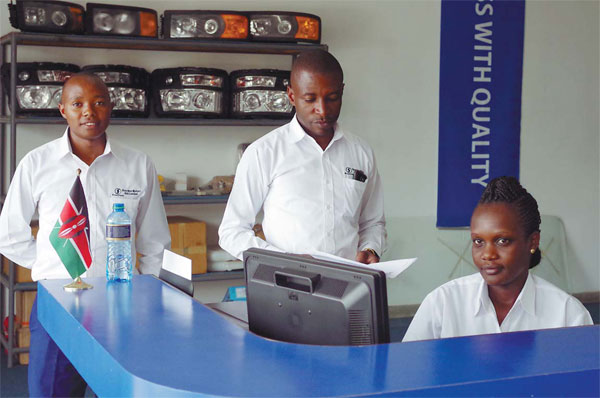Building Kenya the tough way
Rugged Chinese-made heavy trucks are playing a key role in the country's infrastructure development
Construction of the much-needed Mombasa-Nairobi railway, the first new one in Kenya in nearly a century, will be a heavy-duty job.
But that is exactly what Chinese-made Shacman brand trucks are for, says Gou Guoshun, director of the Kenya office of Shaanxi Heavy Duty Automobile Import & Export Co.
The company handles foreign sales of the trucks made by its parent company, Shaanxi Automobile Holding Group.
Shacman, the company's foreign brand, appeared in Kenya as early as 2006 by winning a bid organized by the country's defense ministry. During a 45-day test, the Chinese company's heavy trucks not only performed remarkably, the company says, but also deeply impressed the Kenyans by helping extricate a European competitor's truck that got stuck in mud. The Kenyan government bought 400 Shacman trucks to open the local market to the company.
"We have sold more than 1,800 trucks in Kenya," says Gou, who conceded that sales have not grown as quickly as in other African markets. The company has sold more than 8,000 trucks in Algeria.
With East Africa's relatively developed economy, Kenya should be a big market for heavy trucks. But because of the country's imports of used vehicles, the company's $70,000 new trucks end up competing against $50,000 second-hand trucks of top European brands.
Kenya's emissions requirements put the Chinese company at a disadvantage because they allow second-hand trucks with higher emissions to be sold, easily undercutting the company's new trucks on price.
Gou says he is confident his company could double its sales if Kenya tightened imports of used vehicles. With a new European truck costing about $100,000, Shacman could easily compete at a substantially lower price and with equal quality and technology, he says.
Shacman has been continuously improving its technology, officials say, and starting in the 1980s, incorporated advanced technology and design it licensed for heavy-duty trucks from Steyr Automotive of Austria, and for bus and bus chassis from MAN Group of Germany. In 2003, it signed an agreement with MAN to become the sole licensee for technology used in the German company's F2000 and TG-A series heavy trucks, which are very popular on the world market.
Despite its current disadvantage competing against second-hand trucks, Shacman officials say there will be opportunities from Kenya's massive infrastructure construction boom.
Kenya is using improvements in transport infrastructure to spearhead development. The 485 km railway from the port of Mombasa to the capital, Nairobi, should help promote better connections and development around East Africa. Additional phases are projected to extend the rail line through Uganda to Rwanda, and highways and regional aviation projects may follow.
Shacman won the bid to provide more than 300 vehicles to the China Road and Bridge Corporation, which is building the Kenyan railway project. The first of two shipments of trucks has already arrived in Mombasa.
"The construction of the railway network will take more than a decade to complete," Gou says. "We will take this golden chance to scale up our local assembly to better meet market demand", he said of plans to build vehicle assembly plants in Kenya.
Of the 20,000 trucks the Chinese company hopes to sell in overseas markets this year, more than 8,000 will be sold in Africa, Gou says. "That means Africa will be one of our most important overseas markets."
As Shacman's business expands, more local employees will be needed, he says. The company's Kenya office has 14 employees, all from China, and its local dealer Shacman Motors EA Ltd has more than 30 local workers for sales and service.
"It is not only the wage gap that makes it cost-inefficient to bring workers here from China," Gou says. "Because of their familiarity with local rules and laws, local employees usually can better tap the market and serve the customers".
The parent company, Shaanxi Automobile Holding Group, based in the provincial capital of Xi'an, is also looking toward the future. It is the only manufacturer of new-energy commercial vehicles in Northwest China. Its liquefied natural gas trucks are ahead of the market in Kenya, where there are no refueling stations for them, but they are popular in other places such as Thailand.
This year, the company had sold more than 80,000 trucks in China by August, and its second-quarter sales made it the top seller for that quarter, Gou says.
Shacman heavy duty trucks are sold in more than 80 countries, with Eastern Europe, Russia and the Commonwealth of Independent States, Africa, Southeast Asia, Central and South America, and the Middle East as its major markets. The company has 36 overseas offices; 17 4S shops for sales, spare parts, service and surveys; two large-scale maintenance centers; and 300 stations for routine maintenance.
zhuqiwen@chinadaily.com.cn
|
Local workers at the Kenya office of Shaanxi Heavy Duty Automobile Import & Export Co. Provided to China Daily |



















